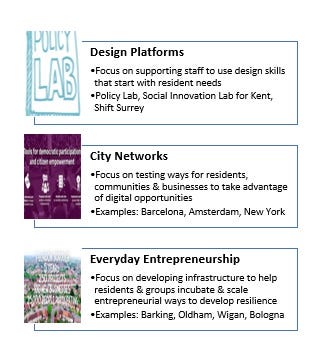People across the world are creating new ways to collaborate to develop solutions to complex issues. They pose both a challenge to the legitimacy of hierarchical organisations like councils and create an opportunity to learn what role councils can play to support them. There’s a need to support & grow activities that develop new forms of resilience and wellbeing.

Councils are uniquely placed to become the platform to help re-invent public services and places. While other councils have cut back to the core, many councils have invested in supporting creative ways for staff, residents & local organisations to tackle issues together, to provide support differently and to shape places. They are also investing in attracting & developing staff with strategic skills which enables organisations to have the support necessary to rethink and re-invent the role of a council on a variety of different issues.
Transformation is often focused on tackling technical challenges, such as making processes in a service more efficient or making the service go digital. These are easy to identify, lend themselves to quick & easy solutions that can be done within a service. The challenges that councils face are more complex, like tackling social isolation, reducing inequality or developing inclusive growth. They’re difficult to understand, they require changes in how we think, how we relate to others and how we work. They require change not just in one service or household, but across boundaries and need us to experiment, to learn and to re-invent. .
While change or transformation programmes have the potential to help people tackle issues in new ways, they can feel exclusive and excluding, in the sense that people can perceive you need special skills to run a transformation or change programme. For strategy & change teams or programmes to thrive, they also need to both take advantage of the opportunities of the place they’re in while stay rooted in the distinctive identities of their neighbourhoods.
That’s why it’s important that any change programme:
- Enables people to immerse themselves in experiences that give them the confidence & context to take part in more structured activities
- Provides stepping stones for people to work differently so that they can take the skills developed and take them back into their teams
- Builds on the existing tools that the council and the surrounding area already use effectively to help people work differently
One of the ways we’ve been doing this in Camden is through the Public Collaboration Lab, a partnership we’ve developed with Central Saint Martins University to bring together researchers, students, frontline staff and community organisations to tackle issues in creative ways.
- Use skills that councils wouldn’t normally call upon to tackle an issue, in this case getting industrial designers to prototype furniture in overcrowded housing, story tellers to develop narratives with young people to develop new youth hubs or product designers to help separate waste better.

- Get people to think differently about how to tackle an issue, whether it’s a game to get people to think how they would rebuild a library that had been burnt to the ground, a tool likening the library to a fantasy island and asked citizens to locate the sites on the island that were most valued by them and explain why or a method asking citizens to ‘operate on the library’ by selecting and prioritising the values that were most important to them.

- Share & codify the lessons learned to develop people use & adapt the methodologies for future projects, so you can see who best to involve at what stage of the process.


